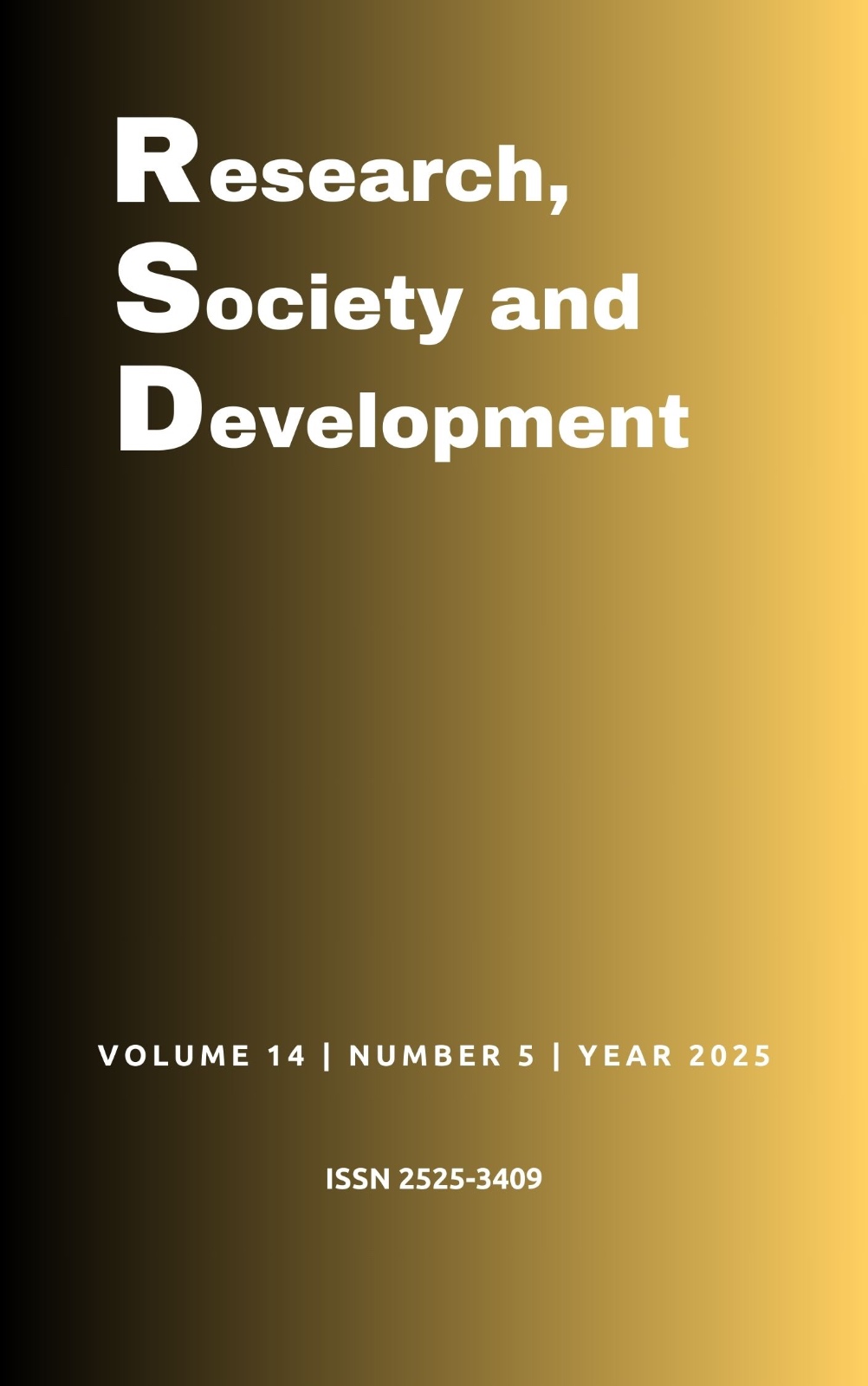Germination test in pepper seeds (Capsicum annuum L.), subjected to insecticide treatment, under different substrates
DOI:
https://doi.org/10.33448/rsd-v14i5.48801Keywords:
Capsicum annuum L.; Germination; Seed treatment; Vermiculite; Rice husk biochar; Blotting paper.Abstract
Bell pepper (Capsicum annuum L.) is one of the main cultivated vegetables, and seed treatment plays a crucial role in ensuring uniform and healthy germination, contributing to crop productivity. This study aimed to evaluate the effectiveness of different substrates in the germination of bell pepper seeds treated with insecticide. The experiment was conducted at the Seed Analysis Teaching Laboratory of the Federal University of Pelotas, using two seed treatments (with and without insecticide) and three types of substrates (blotting paper, blotting paper + vermiculite, and blotting paper + rice husk biochar). The results indicated that the use of blotting paper combined with vermiculite was the most effective, showing the highest germination averages both in the control and insecticide treatments. This can be attributed to the ability of vermiculite to retain the insecticide and protect the seeds from external factors, enhancing its effect. On the other hand, the use of rice husk biochar did not show significant results compared to the control, suggesting that its interaction with the insecticide might be less effective. The analysis of variance and Tukey’s test indicated significant differences between the treatments. It is concluded that vermiculite is a promising substrate for bell pepper seed treatment, while rice husk biochar requires further studies to understand its potential in germination tests.
References
Brasil. Ministério da Agricultura, Pecuária e Abastecimento. (2009). Regras para análise de sementes (399 p.). Brasília, DF.
Costa, C. J. (2008). A importância do controle de qualidade de sementes (2 p.). Embrapa Cerrados.
Figliolia, M. B., Martins, L., Novembre, A. D. L. C., Chamma, H. M. C. P., & Piña Rodrigues, F. C. M. (2005). Aferição de testes de germinação de sementes florestais nativas. Informativo ABRATES, 15(1–3), 327.
Franco, D. F., Junior, A. M. M., Costa, C. J., & Silva, M. G. (2013). Harvesting, drying, processing and treatment of irrigated rice seeds. Embrapa Temperate Climate. (Documents, 371).
Menten, J. O. M., Flores, D., Moraes, M. H. D., Sampaio, I., & Moreira, H. (2010). Tratamento de sementes. Palestra apresentada no III Workshop Brasileiro sobre Controle de Qualidade de Sementes – ABRATES, UFU, UFLA, Uberlândia, MG, 06/10/2010. Resumo publicado no Informativo ABRATES, 20(3).
Netto, J. R. C., et al. (2012). Avaliação da influência do tratamento de semente na produtividade da soja em Paragominas-PA. Anais/Resumos da 64ª Reunião Anual da SBPC.
Pereira, A. S., et al. (2018). Metodologia da pesquisa científica (E-book gratuito). Ed. UAB/NTE/UFSM.
Pereira Filho, I. A., & Teixeira, F. F. (2016). O cultivo do milho-doce. Informativo técnico. Embrapa.
Pereira, R. B., Pinheiro, J. B., & Carvalho, A. D. F. de. (2013). Manejo do oídio em pimentão: Um desafio em cultivo protegido. Embrapa. Comunicado Técnico 94.
Peske, S. T., Villela, F. A., & Meneghello, G. E. (2019). Sementes: Fundamentos científicos e tecnológicos (4ª ed.).
Popinigis, F. (1985). Fisiologia de sementes (285 p.). Brasília: AGIPLAN.
Posse, S. C. P., Silva, R. F. da, & Vieira, H. D. (2004). Temperatura de armazenamento e desempenho de sementes hidratadas e osmocondicionadas de pimentão. Revista Brasileira de Sementes, 26(1), 38–43.
Silva, N. D. (2016). Substratos e metodologia alternativa para o teste de germinação em sementes de soja tratadas quimicamente (Dissertação de Mestrado). Faculdade de Agronomia Eliseu Maciel, UFPEL, Pelotas-RS.
Talamani, V., Lima, N. S., Menezes, M. S., Silva, A. M. F., Sousa, R. C. de, & Silva, L. M. da. (2010). Qualidade fisiológica e sanitária de sementes de feijão (Phaseolus vulgaris L.) produzidas por agricultores familiares em Sergipe. Embrapa Tabuleiros Costeiros.
Downloads
Published
How to Cite
Issue
Section
License
Copyright (c) 2025 Shemene Jaber Suliman Abdullah Audeh; Deisiane Lopes da Silva; Andreia da Silva Almeida; Henrique de Matos Ferreira Cavalheiro; Jonatas Munari Silveira; Tiéle Soares Duarte; Kimberly dos Santos Alves

This work is licensed under a Creative Commons Attribution 4.0 International License.
Authors who publish with this journal agree to the following terms:
1) Authors retain copyright and grant the journal right of first publication with the work simultaneously licensed under a Creative Commons Attribution License that allows others to share the work with an acknowledgement of the work's authorship and initial publication in this journal.
2) Authors are able to enter into separate, additional contractual arrangements for the non-exclusive distribution of the journal's published version of the work (e.g., post it to an institutional repository or publish it in a book), with an acknowledgement of its initial publication in this journal.
3) Authors are permitted and encouraged to post their work online (e.g., in institutional repositories or on their website) prior to and during the submission process, as it can lead to productive exchanges, as well as earlier and greater citation of published work.

